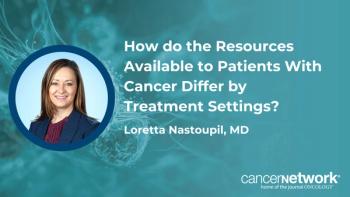
Retrospective Radiotherapy in IBD Data May Warrant Prospective Research
Retrospective study data show that patients with inflammatory bowel disease may not require modification of standard radiotherapy for pelvic malignancies.
CancerNetwork® spoke with Bhupesh Parashar, MD, a physician professor, vice-chair of research, and co-director of the head and neck cancer service in Radiation Medicine at the Center for Advanced Medicine of Northwell Health Cancer Institute, about the next steps in researching modern radiotherapy techniques in patients with inflammatory bowel disease (IBD) treated for pelvic malignancies.
Parashar began by suggesting that there were limitations to the retrospective study despite its results. He followed by mentioning a plan to facilitate a prospective study of patients with IBD planning to undergo radiation, particularly with advanced therapies.
Trial results were presented at the
Parashar conducted this research with lead author Julia Zinkin, a visiting scholar at Northwell Health.
Transcript:
Julia’s findings were very interesting, and there are limitations to [performing] a retrospective study. The next step is to do a prospective evaluation of these patients who have IBD and are planning to get radiation. We plan to use advanced radiation techniques like intensity-modulated radiation therapy [IMRT], stereotactic body radiation therapy [SBRT], volumetric arc therapy, or proton [therapy]. These are new [and advanced] techniques, and we plan to use them in a prospective manner in this group of patients who have IBD. Hopefully, based on Julia's initial results, we want to [confirm them] in a prospective way.
Reference
Zinkin, J, Ziemba Y, Zinkin H, Akerman M, Parashar B. Toxicity with contemporary radiotherapy in inflammatory bowel disease patients treated for pelvic malignancies. Presented at the 2024 American Society for Radiation Oncology (ASTRO) Annual Meeting; September 29 – October 2, 2024; Washington, DC. Abstract 2941.
Newsletter
Stay up to date on recent advances in the multidisciplinary approach to cancer.



















































